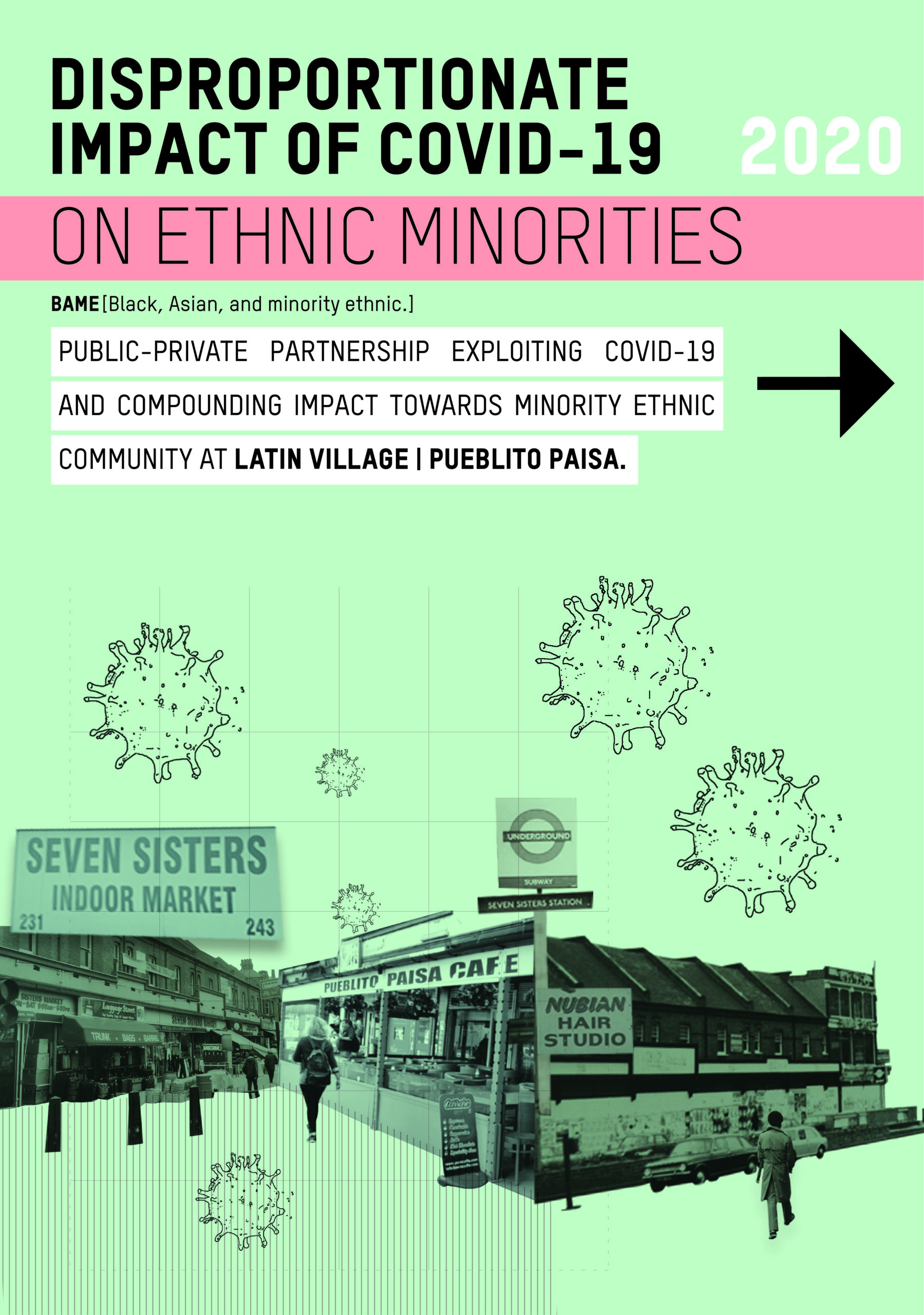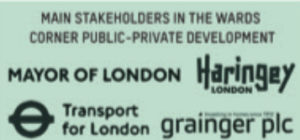Private-Public Partnership Treatment of BAME community during COVID-19
Thurs 12 March
- In a Downing Street statement Boris Johnson PM announced: “Many families will lose their loved ones before their time” which sent the UK into a state of panic buying which caused food shortages.
- Deputy Mayor of London Joanne McCartney chaired a meeting with landowner Transport for London (TfL) with BAME traders regarding the essential remedial works, and TfL promised they would do everything they could to keep the market open.
Mon 16 March
- Power cut to all BAME traders because TfL lessee MAM/Quarterbridge, with Grainger PLC acting as guarantor, was caught in the unlawful abstraction of electricity through its connection to the grid from a neighbouring building. By ‘unlawful’ we mean a criminal act, specifically commission of an offence under Section 13 of the Theft Act 1968. The supplier cut off unauthorised supply.
- There is no natural light in the Latin Village and BAME traders work in the dark while losing perishable food supplies during a week of frantic panic buying and food shortages.
- The United Nations released a statement in relation to the COVID-19 outbreak which stated some may find “emergency powers attractive because it offers shortcuts.”
Mon 23 March
- Prime Minister Boris Johnson introduced new measures ordering the closure of non-essential shops which excluded “market stalls which offer essential retail, such as grocery and food” and restaurants with could offer takeaways.
- Private-public partnership agent MAM/Quarterbridge advises traders market will remain open as “many report increased sales as Shoppers seeking an alternative to Supermarkets. The shorter supply chain of Market retailers means they are less subject to delivery delays.”
- Grainger PLC writes to BAME traders drawing attention to their loss of legal appeal against move to Apex House and demolition of Wards Corner site. Grainger PLC advises BAME traders of plans to move BAME traders by the end of the year.
Tues 24 March
- In a u-turn measure, private-public partnership agent MAM/Quarterbridge ordered the closure of the Latin Village which is within Seven Sisters Indoor Market alerting traders that, “We have been asked by LB Haringey Public Health Department to advise them of any non-compliance.” Many of the BAME traders sell specialised food products for the Latin American population which is not provided in the main food chainstores.
- A few days after essential food outlets were eventually ordered to close completely and the BAME traders were still without power BAME traders were treated in an insensitive manner. According to BAME traders: private-public partnership agent staff said to BAME traders “you no longer have a future here, the electricity is not going to be fixed, you have already lost everything, and you’ll have to adjust to the new rules when you’re moved”.
- BAME traders question the actual motive behind the prevention of sales of culturally appropriate food. According to Queens Market in East London: “the provision of culturally appropriate food is vital to build up peoples’ immune systems and the developers are clearly taking advantage of COVID-19 and it is a dangerous precedent”.
Wed 1 April
- Afro-Colombian trader Fabian who was supported for many years by David Lammy MP while he filed and fought his race discrimination case against private-public partnership agent MAM/Quarterbridge was admitted to the intensive care due to contracting coronavirus.
- It was reported in the press that Harvard University researchers found that workplaces, where stress levels are high, have worse rates of infections. We suspect that all the stress that led up to his admission was not helpful.
Thurs 9 April
- Private-Public partnership agent MAM/Quarterbridge advised BAME traders to visit Latin Village to collect letters and handover keys during official lockdown close to the COVID-19 peak on the Easter Weekend
- The BAME traders have been under significant stress, discrimination, etc since Quarterbridge/MAM’s appointment in 2015, compounded by COVID-19 and the power cut on the 16th March which left them with no power. The electricity has still not been restored at the time of writing this post.
- BAME traders are considering that the current COVID-19 crisis is being used as a shortcut to achieve private-public partnership development agenda.
- According to the BBC reporting on the UK situation “there is some evidence to suggest that coronavirus is having a disproportionate impact on people from ethnic minority backgrounds.
Mon 11 May
An insolvency practitioner is appointed by the current market operator. They communicate to the traders that if a deal is not possible the Latin Village may shut permanently, threatening the 40 BAME businesses and the livelihood of approximately 120 workers.
Fri 22 May
Grainger PLC is hastening Apex House works while TfL is stalling the restoration of electricity at the Latin Village. Traders are asked to participate in the unit design, however, no information is provided on forecasted rents. Communication is sent to Market Facilitator copying in Grainger PLC CEO requesting forecasted rent information. The requested information is not provided.
Sun 24 May
Boris Johnson PM announces a planned date for reopening non-essential business. Public-partnership agent MAM/Quarterbridge reminds traders that the Latin Village will not reopen and adds padlocks to the main entrances to all the main entrances to prevent traders from accessing their trading units.
Tues 2 June
In concert with their agent, TfL informs traders that the Latin Village may not reopen soon due to essential works “as a result of years of neglect“. Seventy-five percent of the market is still without power and TfL has stalled the restoration of electricity throughout the lockdown.
Fri 5 June
MAM/Quarterbridge issues traders rent invoice despite the fact that:
- they are enjoying a rent holiday by landlord TfL until the COVID-19 situation returns to normal
- they have been defrauding traders in the overcharging of utilities
- they were caught by TfL in the unlawful abstraction of electricity through its connection to the grid from a neighbouring building. By ‘unlawful’ we mean a criminal act, specifically commission of an offence under Section 13 of the Theft Act 1968
- a race discrimination claim was filed under the Equality Act 2010 against them by Afro-Latin trader Fabian in addition to numerous complaints of discrimination, victimisation, and harassment
Mon 15 Jun
Non-essential businesses and indoor markets are allowed to open in the UK. The Latin Village|Pueblito Paisa in Seven Sisters Indoor Market is an exception. Due to managed decline over almost 5 years which has been taken too far by public-private partnership stakeholders, and essential remedial works being stalled during the COVID-19 lockdown. BAME traders and Latin American community are paying the consequences of structural racism whilst COVID-19 was already exacerbating existing inequalities and will be unable to trade. Moreover, the wider Latin American community is without a Mutual Aid Centre and registered Community Asset during a time of a forecasted economic recession.





